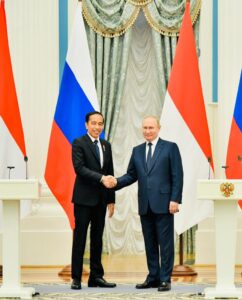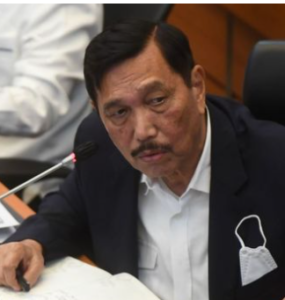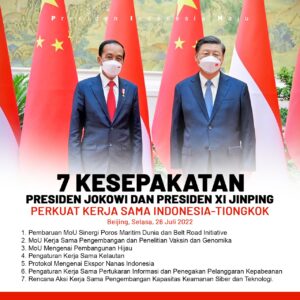
STRATEGIC ASSESSMENT. Indonesia may provide another $13.43 billion (IDR200 trillion) worth of subsidies if no decision is made to raise the price of subsidized fuel, as consumption is projected to exceed the quota set for the full year. Finance Minister Sri Mulyani on Tuesday said the hike would swell the subsidy and compensation budget by 40 percent to IDR700 trillion.
While fiscal consolidation remains on track, the move would see the government take another chunk out of the state’s windfall revenue from commodity exports to keep fuel cheap. Sri Mulyani said topping up the subsidy was not the only way to solve the problem, as two other options were still on the table: either restrict fuel sales or hike the price of subsidized fuel.

Commenting on the plan to import oil from Russia, House member from National Awakening Party faction Syaikhul Islam on Wednesday asked the government to make policy breakthroughs so that the price of subsidized fuel Pertalite and diesel types does not rise.
He claimed that some of the U.S. allies in Europe continued to import Russian oil and asked why the Indonesian government had not done so. He also hopes that the government would be bold enough to take important steps for the benefit of the people.
Indonesia’s energy firm PT Kilang Pertamina Internasional is reviewing the risks it may face if it purchases crude oil from Russia, its chief executive said on Thursday, amid rising energy demand and a ballooning subsidy bill. The government is currently studying policy options for subsidized fuel prices and a number of lawmakers this week called for imports of cheaper Russian crude oil.
Foreign Affairs Ministry Spokesperson Teuku Faizasyah, at a virtual press conference on Thursday, said it is not the government’s capacity to respond to the issue that the Indonesian government wants to import cheap crude oil from Russia, as it was more business-to-business in nature.
He said institutions operating in the oil sector can certainly make decisions with various considerations. Teuku said in the context of economic diplomacy, Indonesia is also trying to find alternatives for energy sources that can meet the people’s needs at an economical price.
Economic Affairs Coordinating Minister Airlangga Hartarto, at the Presidential Palace complex in Jakarta on Thursday, said the government is reviewing the social assistance budget to prepare for the potential increase of prices of subsidized Pertalite and Solar fuels.
Finance Minister Sri Mulyani, after meeting the House Commission XI on Wednesday, said the government has allocated IDR502 trillion for energy subsidy and compensation in the 2022 state budget. She said there must be an approval from the House of Representatives if more fuel subsidies are required in the future.
Finance Minister Sri Mulyani Indrawati, in a press conference on Friday, said the government requires an additional IDR195 trillion in energy subsidies in 2022 because the current energy subsidies of IDR502 trillion will only last until October due to excessive consumption of Solar (diesel) and Pertalite-type fuels that exceeds the government’s quota.
She said that energy subsidies were mostly enjoyed by wealthy households or the upper-middle class. “We may not revoke the subsidy, but the distribution must be on target for those who truly cannot afford it,” she said.
Finance Minister Sri Mulyani Indrawati at a press conference on Monday said the government is set to roll out three social aid schemes worth $1.62 billion (IDR24.17 trillion) in a bid to strengthen people’s buying power amid the risk of inflationary pressure, as a result of an expected subsidized fuel price hike.
Although not stating clearly that the government would soon increase the subsidized fuel prices, including Pertalite gasoline and Solar diesel, Sri Mulyani explained the additional social aid fund was a part of the energy subsidy-diversion strategy, as instructed by President Jokowi.
She elaborated that the social assistance would be divided into three types, namely direct cash transfers (BLT), wage subsidies, and a regional transfer budget allocation for public transportation.
Hundreds of online motorcycle taxi drivers protested the price increase in subsidized Pertalite and Biosolar fuel on Monday in front of the House of Representatives Building in Jakarta, claiming that it would harm their economy.
Aside from the price increase plan, motorcycle taxi drivers demanded amendments to the regulation of partnerships between drivers and online motorcycle taxi providers since the current regulation has not protected drivers.

Maritime Affairs and Investment Coordinating Minister Luhut Binsar Pandjaitan on Tuesday asked governors, mayors, and district heads across Indonesia to disseminate information to the public about the imminent fuel price increase and the government’s effort to cushion the effects.
Finance Minister Sri Mulyani Indrawati at a House plenary meeting on Tuesday cautioned that subsidies and compensation for fuel could reach more than IDR698 trillion by the end of 2022, above the IDR502.4 trillion 2022 state budget quota. She said the excessively large subsidy was caused by the upward trend in oil prices, the weakening of the rupiah exchange rate, and the large consumption of pertalite and diesel.

Social Affairs Minister Tri Rismaharini said on Monday that the distribution of social assistance in lieu of fuel subsidies will begin on Sep. 1, in addition to the three-monthly distribution of regular social assistance. She said that the government will distribute social assistance in the form of direct cash assistance (BLT) every two months, giving each beneficiary group IDR300.000.
Finance Minister Sri Mulyani said the subsidy and compensation fund scheme for the 2022 state budget in the energy sector has increased threefold.
She said the price of oil has risen above $100 per barrel, increasing the gap between the economic price of fuel and the price set by the government. Furthermore, the hike in subsidy funds is not accompanied by the on-target achievement of subsidized fuel.
President Jokowi, at the Sentani Post Office in Jayapura District, Papua on Wednesday, launched the direct cash transfers (locally known as BLT) social aid, ahead of an expected subsidized fuel price hike.
He said the aid will be distributed to 20.6 million beneficiary groups, and it will be disbursed four times, IDR150,000 per person. Jokowi said the aid will help maintain the people’s purchasing power.
The government is also set to roll out two more social aid packages, including wage subsidies worth IDR600,000 per person aimed at 16 million workers earning a maximum salary of IDR3.5 million a month, and a new regulation to protect the public transportation sector.
President Joko Widodo (Jokowi) has said he is convinced that despite the ongoing global uncertainty, Indonesia has fared better in terms of maintaining economic growth and controlling inflation, especially compared to the United States.

At a gathering attended by PT Freeport Indonesia president commissioner Richard Adkerson and company employees in Mimika district, Papua, on Wednesday, Jokowi highlighted that Indonesia recorded positive economic growth and controlled inflation this year.
“We need to be thankful because our country, Indonesia, recorded 5.44 percent economic growth in the second quarter (of 2022) and maintained a 4.9 percent inflation level. I want to ask Mr. Richard (Adkerson) about the United States’ growth and inflation level later. I believe we fared better,” the President remarked.
The Finance Ministry is targeting to keep this year’s inflation rate within a range of 4.5 to 4.8 percent, surpassing the government’s latest outlook as mentioned by President Jokowi. Deputy Finance Minister Suahasil Nazara on Wednesday said that inflation had continued to rise in recent months, reaching 4.94 percent in July.

However, he said the inflation was still below five percent and under control. Suahasil said that the high inflation rate is a result of the current global situation, where energy and commodity prices are rising. Therefore, Indonesia must be able to show high economic growth if inflation continues to rise.
Local governments can use the IDR14 trillion contingency fund for unforeseen and unexpected expenses in the 2022 regional budget (APBD) for efforts to counter inflation, Finance Minister Sri Mulyani said during a meeting with the House of Representatives.
Economic Affairs Coordinating Minister Airlangga Hartarto, at the Pelita Harapan University (UPH) Festival on Friday, said Indonesia managed to deal with domestic inflation better than other countries, despite the COVID-19 pandemic, the conflict between Ukraine and Russia, climate change, rising commodity and energy prices, and rising cost of living. He said inflation in Indonesia was still 4.9 percent as of June and that Indonesia has succeeded in dealing with inflation.
The editor has underlined that the majority of grassroots people in Indonesia were rejecting Pertalite, Solar and Pertamax hike prices and the worry of people is happening. Since fuel prices hike, many of food, transportation, social life and other people’s needs have been rising their prices and there is making seriously economi situation trouble and responding on this facts, several mass organization, labor political party, NGO, driver ojek online etc have been arranged their massive strikes against “unpopulized government decision”. Strikes or mass rallies will start on September 5th until unpredictable time.





